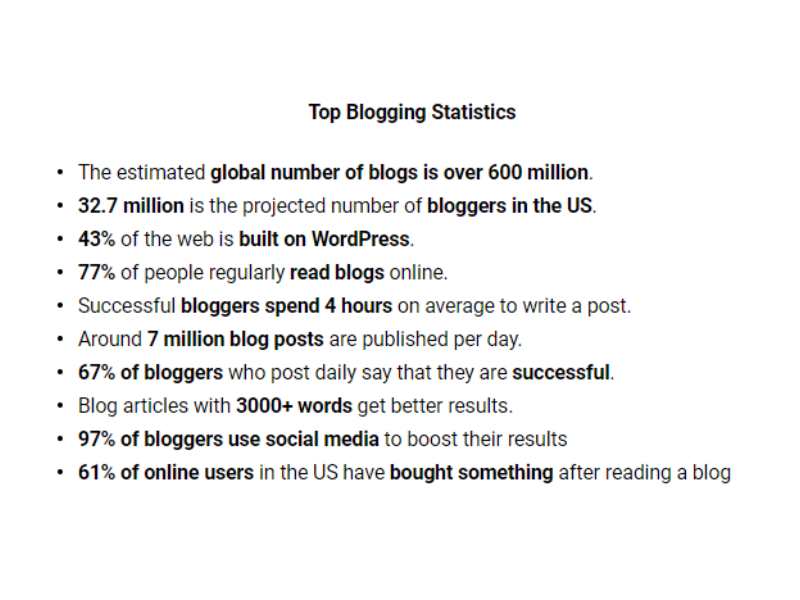Table of Contents
Blogs are similar to pleasant talks with friends over coffee, but they take place online and include search engines. Imagine having a fantastic website with all your amazing items, such as the newest fashion trends, game-changing fitness advice, or tantalizing recipes. However, search engines like Google, Bing, and their friends need help finding your website. In that case, it’s like throwing a party without inviting anyone. That’s where blogs come in; they act as reliable messengers, spreading the word about your website across the online community.
Let’s dig further and understand why blogs significantly influence your website’s SEO performance.
What is Blog SEO?
SEO, which stands for Search Engine Optimization, is the art and science of improving a website’s visibility on search engines like Google. It involves various techniques and strategies to enhance a website’s ranking in organic (non-paid) search results. The ultimate goal of SEO is to drive more relevant and organic traffic to a website, thereby increasing its online presence, attracting potential customers, and achieving better overall performance in the digital landscape.
What is blog seo, then?
Blog SEO, therefore is like giving your blog a superhero cape to stand out online. When you write a blog post, you want people to find it. Imagine your blog is a cozy café tucked away in a bustling city – you want folks to stroll in and enjoy your delicious brews (or, in this case, your awesome content).
Well, that’s where SEO swoops in. SEO stands for Search Engine Optimization, and it’s like the map that helps people find your café in the first place. When someone types a question or a topic into a search engine, like “best hiking trails” or “how to make fluffy pancakes,” they get a list of websites. And guess what? You want your blog to be one of the top spots on that list.
Blog SEO is about using clever strategies to ensure your blog appears near the top of those search results. It’s like sprinkling a little magic – well, maybe it’s not real magic, but it feels like it – onto your blog posts so that search engines like Google go, “Hey, this blog knows its stuff! Let’s show it to people who are looking for exactly that.”
Now, how do you do this magic? Things are mixed. You choose certain keywords, sometimes referred to as words and phrases that people are searching for. Therefore, if you’re writing a blog post on the greatest hiking trails, you should utilize keywords like “scenic hikes,” “trail tips,” and “nature adventure.”
You also want to make your blog simple for people and search engines. No one wants to wait around for a sluggish website, so you must organize your postings so they are easy to access and load quickly. Additionally, you may provide links to additional helpful pages inside your blog and from reliable third-party websites. These links serve as little arrows pointing at your blog, indicating to search engines that your blog is well-connected and informative.
Types of Blogs You Should Include In Your Website
Do you know that most experts agree that the first blog was written in 1994 by a student as a place to publish his writing? From then on, many writers followed in his footsteps, and today, blogs are an integral part of the Internet industry.
So what types of blogs should your website have to help increase its visibility? Here are a few of the most common:
- Educational/Informative Blogs: Share important insights, ideas, and how-to guides with your audience to educate them about your business or specialty.
- Listicles: Make simple lists with useful information, such as “Top 10 Productivity Hacks” or “5 Essential Travel Accessories.”
- Case Studies: Showcase real-life instances of how your goods or services have helped your consumers overcome specific difficulties.
- Interviews: Include interviews with industry experts, influencers, or pleased customers to present a variety of viewpoints.
- Opinion/Thought Leadership Blogs: Share your thoughts, forecasts, and observations on industry trends and developments.
- Product/Service Spotlight: Highlight particular goods or services you provide, emphasizing their merits and application scenarios.
- How-to Guides/Tutorials: Provide detailed instructions on how to do certain activities or projects.
- Success Stories/Testimonials: Share examples of how your offerings have improved the lives or companies of your clients.
- Interactive Content: Create intriguing material like quizzes, polls, or infographics to stimulate user interaction.
How Can Blog Improve Search Engine Optimization?
Blogging is a great strategy to help your website rank higher in search engines like Google. It’s part of a smart strategy to boost your website’s visibility in search results. By carefully crafting blogs, you initiate most important processes that interact with search engines. These processes help search engines recognize and favor your website, particularly Google.
Fresh Content
Fresh material is as appealing to search engines as a warm batch of chocolate chip cookies is to you. When you consistently publish fresh blog content, you’re dishing out those delectable cookies for search engines to devour. They will return to your website, indexing fresh information and increasing your chances of ranking higher in search results.
Keywords Integration
Blogging provides the ideal canvas for sprinkling those magical keywords across your material. These keywords are the hidden code search engines use to match what people are looking for with what you have to offer. For example, if you’re a fitness expert and your blog post is all about “effective home workouts,” incorporating that word wisely in your article informs search engines that you’re an expert on the subject.
Cultivation of Long-Tail Keywords
Long-tail keywords are a thorough treasure map, directing searchers directly to your content’s resources. Long-tail keywords are naturally used when writing blog content about specific topics. Although these keywords have a lower search volume, they are quite useful since they attract highly focused visitors interested in your offer. For example, “tips for growing organic tomatoes indoors” is a long-tail term that will direct garden aficionados to your gardening site.
Link Building
Blogging provides a universe of linking opportunities. Within your website, you may link from one blog post to another, creating a web of interconnectedness that keeps people clicking and exploring. You may also contact other bloggers or websites and ask them to link to your quality blog entries. This link-building jigsaw puzzle helps users find more of your material and sends favorable signals to search engines, increasing your authority.
Showcasing Your Expertise
Blogging helps you to demonstrate your expertise and position yourself as an authority in your subject. Whether you’re giving fashion advice, tech reviews, or vacation anecdotes, publishing informative and helpful information regularly increases your reputation. What’s more, guess what? Because search engines value authoritative sources, your blog is more likely to rank higher in search results.
Optimization of User Experience
Search engines are concerned with more than keywords and links; they also have concerns with user experience. A well-written blog post with interesting content, clear headers, and a reader-friendly layout keeps readers on your website. The longer people stay on your site reading and studying your material, the more search engines notice and deem your blog worthy of a better rating.
Factors Affecting Blog SEO
Several things can impact how well your blog performs in terms of SEO, determining how high your blog posts appear in search engine results. Here are some important factors to consider:
- Keywords: The words and phrases you use in your blog posts matter. Including relevant keywords that people might search for helps search engines understand what your content is about.
- Content Quality: High-quality, informative, and well-written content will attract readers and get shared. Search engines value user satisfaction so that good content can improve rankings.
- Title Tags and Headings: The title of your blog post and the headings you use give search engines important clues about your content’s main topics.
- Meta Descriptions: These are short descriptions that show up in search results. They give readers a sneak peek into your content and can influence whether they click on your link.
- URL Structure: A clear and descriptive URL helps search engines and readers understand what the page is about.
- Internal and External Links: Including links to other pages on your site (internal) and other reputable websites (external) can boost your blog’s credibility and authority.
- Mobile-Friendliness: With more people using mobile devices to browse the web, search engines prefer websites that are easy to use on mobile.
- Page Speed: Slow-loading pages can frustrate users and hurt your SEO. Fast-loading pages are more likely to rank higher in SERP.
- Images and Multimedia: Properly optimized images and videos can enhance your blog’s user experience and engage readers.
- Social Signals: Social media engagement and shares can indirectly influence your blog’s SEO. Popular and shared content may get more visibility from search engines.
- User Engagement Metrics: How long visitors stay on your page, how many pages they visit, and how quickly they leave (bounce rate) can all impact your blog’s SEO.
- Secure and Accessible Website: Search engines favor websites with secure connections (HTTPS) and those that are easy for website users and search engine bots to navigate.
- Freshness of Content: Regularly updating your blog with new posts signals to search engines that your website is active and relevant.
- Geographical Relevance: If your blog has a local focus, optimizing for local SEO can help you attract nearby readers.
- Structured Data Markup: Including structured data in your blog can provide more context to search engines, potentially leading to enhanced search results features like rich snippets.
Frequently Asked Questions
The frequency you publish blog entries might affect your SEO, but there is no one-size-fits-all solution. The trick is to stick to a timetable aligned with your resources, goals, and target audience.
Blogging may be an effective approach for gaining backlinks to your website. Backlinks are the links from other websites that point to your website and are extremely important in SEO. When you generate high-quality and valuable blog material, other websites are likelier to want to link to it as a reference or resource.
You can assess the SEO effect of your blog by tracking important indicators such as organic traffic, keyword ranks, and backlinks. Use tools such as Google Analytics for traffic insights, SEO platforms for keyword tracking, and backlink analysis tools to examine the quality and amount of links your blog creates. Analyzing these data can provide insights into how your blog leads to enhanced search visibility and user engagement.
Making a lot of content is the cost of admission! Good news for ordinary old blogs or specialty sites like those you may find on a SaaS product’s website or an e-commerce site: if you’re following an aggressive SEO approach, you need to write 3+ blog entries every week.
Conclusion
Blogging is more than simply blogging; it’s about paving a path to the hearts of search engines. You send signals with each well-written piece, saying, “Hey, we know our stuff!” And search engines, particularly Google, appreciate the effort.
Remember that it’s not simply about stuffing your site with content. The main goal is to prioritize quality over quantity. Share your knowledge, answer others’ queries, and create material as entertaining as a blockbuster film. Watch your audience grow. Your keywords rise, and those backlinks. They’ll start pouring in like invites to the town’s hottest party.
Whatever niche you want to pursue, continue writing, be consistent, and who knows? Thanks to the power of blogging and SEO, one day, your blog will soon be the talk of the town.


